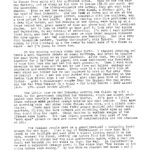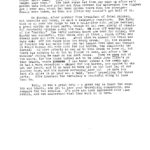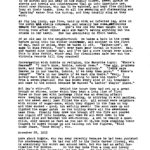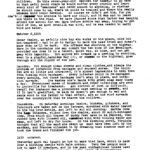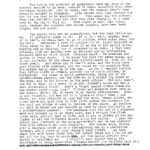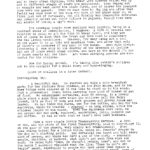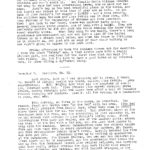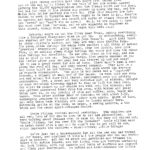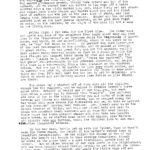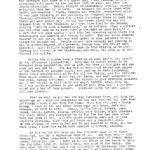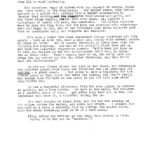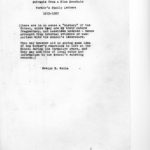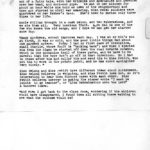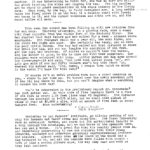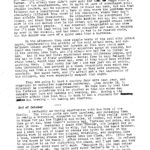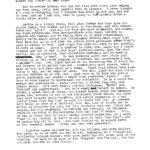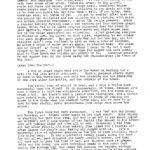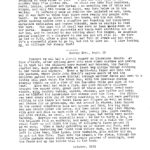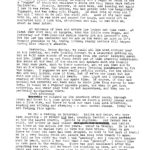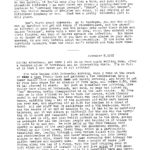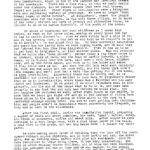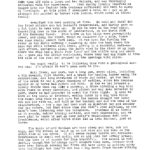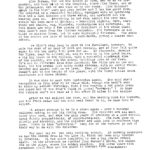Pine Mountain Settlement School
Series 09: Biography – Staff/Personnel
Series 07: Directors
EVELYN K. WELLS 1915 EXCERPTS FROM LETTERS HOME, 1915 – 1927
Secretary 1916 – 1931
Acting Director 1931
TAGS: Evelyn K. Wells ; Evelyn K. Wells 1915 Excerpts from Letters Home ; Pine Mountain Settlement School ; transcriptions ; letters ; Marguerite Butler ; Board of Trustees ; PMSS early history ; quarantine ; smallpox
The following extracts are taken from the letters of Evelyn Wells to her family and contain graphic descriptions of life at Pine Mountain during the foundational days of the School from 1915 to 1927.
Evelyn Wells describes the “Extracts from a Pine Mountain Worker’s Family Letters 1915-1927″:
These are in no sense a “history” of the School, since they are by their nature fragmentary, and sometimes undated — hence arranged from internal evidence or comparison with the School’s literature.
They may however aid in giving some idea of one worker’s reactions to life at the School during its formative years, and they may add bits of local color and information to the School’s existing records.)
See Also EVELYN K. WELLS Biography
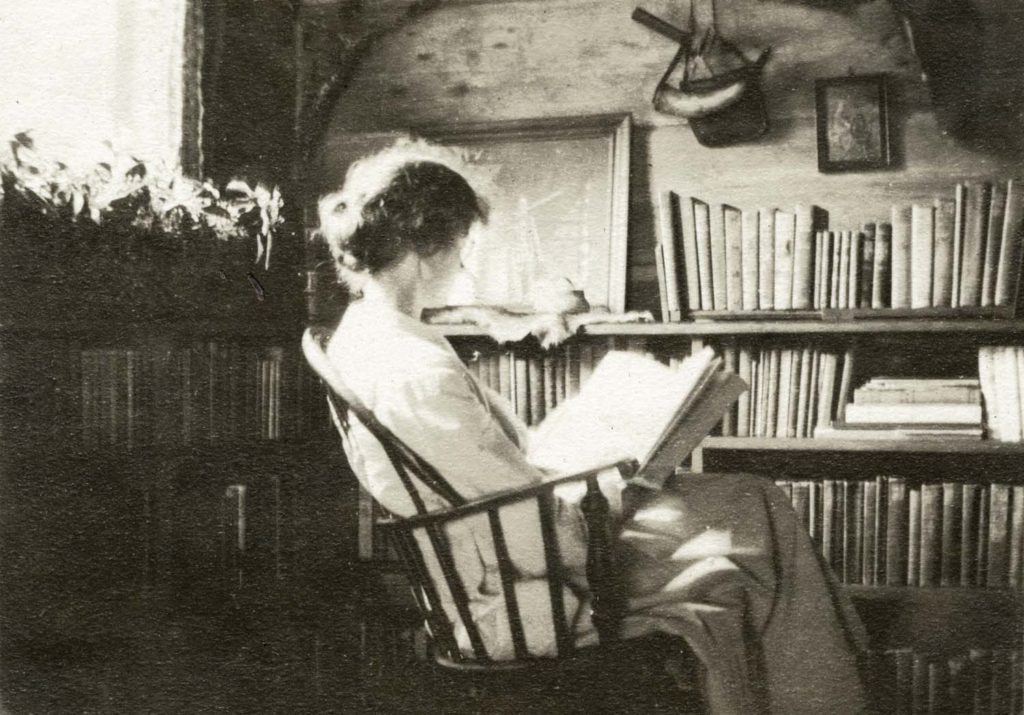
Evelyn K. Wells,reading. Katherine Pettit Album I.
TRANSCRIPTION: Evelyn K. Wells 1915 Excerpts from Letters Home
1915 Fall [p.01-006] ( First call on Aunt Sal. She looks as if she’s come straight out of a fairy tale, with her wrinkles and spectacles and kerchief overhead and her corn-cob pipe… (p.00)
First call on Aunt Sal [Aunt Sal Creech]. She looks as if she’d come straight out of a fairy tale, with her wrinkles and spectacles and kerchief over her head, and corn-cob pipe. We sat in her kitchen for about an hour while she told us news of the neighborhood and then got started on Civil War memories, when rebel soldiers were quartered on her father’a land. She’s been to Harlan only three times in her life.
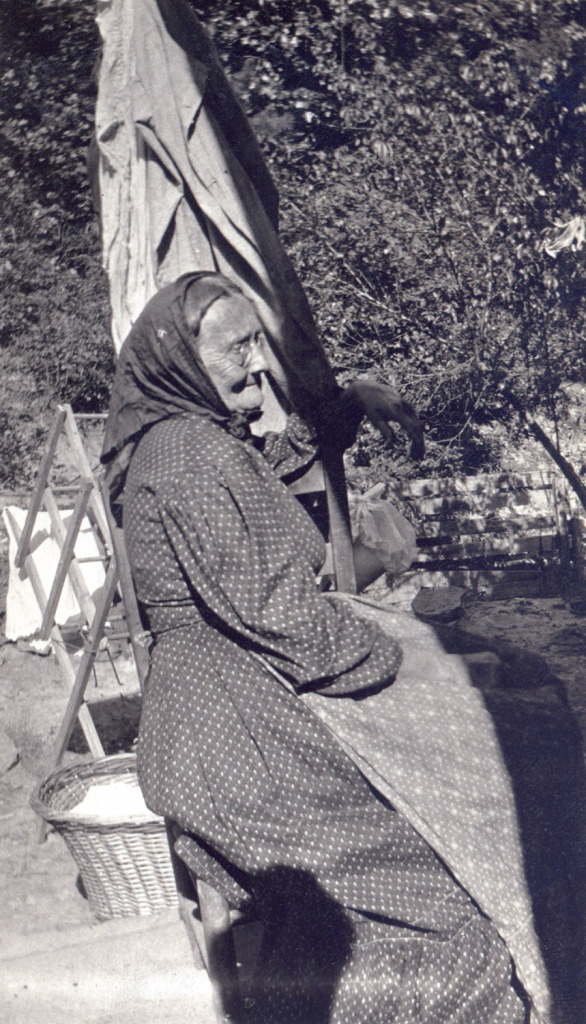
XII Helen de Long Photograph Album. Aunt Sal Creech. [pmss3170_mod.jpg]
Uncle William [Uncle William Creech] brought in a muskmelon, and two watermelons, and we ate them all. Very luscious fruit. Aunt Sal is one of the few who knows the old songs, and I hope we can get her started some day.
Thank goodness, school improves each day. I was at my wits’ end at first, it was so cold, and the poor little things had about one garment apiece. Today I had my first case of discipline, small Charlie, whose fault is “talking back”; and when I ejected him from the class he started off down the road towards Cutshin, which is the moonshine trail of these parts, and we have to be careful that the boys don’t go off in that direction. So I had to chase after him and collar him and send him to Miss Pettit, who put him to work in the potato patch, and he has since apologized very nicely. *
Miss de Long [Ethel de Long] and Miss Pettit [Katherine Pettit] have different ideas about punishment. Miss de Long believes in whipping, and Miss Pettit does not, so it’s interesting to hear them discuss cases with each other. Miss Pettit believes however in making the sinner write “I must be polite to my teacher”, or “Liza Nabomination unto the Lord” a hundred times.
*And when I got back to the class room, wondering if the children would have disappeared, I found them all sitting there waiting to see what the outcome would be!
1915-16 Monday [p.02-007]. Aunt Sal came down and she and Miss Read [Dora Hill Read Goodale] dipped beeswax candles … (p.2)
Page 1 [partial]
Monday Aunt Sal came down and she and Miss Read dipped beeswax camdles. It was interesting to watch her, she was so sure and skillful about twisting the wicks and dipping the wax. Two big candles are to stand in gourd candlesticks on the stone chimney in the living room. That room, by the way, is fully furnished now. A long settle faces the fire; above it on the wall is a Paisley shawl with lovely red tones in it, and the corner bookcases and seats are in, and the round tables all made [by hand].
This week the school has been filling up with new children from far and near, Thursday afternoon, in a pouring rain, came a woman with four children from the Middle Fork of the Kentucky River. She had started four days before and had walked for a week — crossed seven mountains,. The youngest child was a year old, the next three, and the other two eight and nine. She certainly was weary, and so were the poor little things. The boy had walked all that distance in shoes too small for him, and you can imagine the condition of his feet. And the girl had trachoma. Of course we couldn’t take the babies, and the mother is going to try to hire out with them somewhere. Our children were entranced with them. Little Marcus put his arms around Loly Ann said if she had fifty dollars she’d buy that least ‘un, wherat the mother said, “Why, honey, I reckon they haint no money in the world I’d take for that baby!”
Of course, it’s an awful problem when such a crowd descends on you — where to put them up. We turned over the newly scrubbed loft of the Old Log House to them, but you can’t imagine what a scrubbing it needed the next day!
You’d be interested in the preliminary report Mr. Obenchain* has just gotten out. On this side of Pine Mountain, there is a rise of one foot in every 1.34 feet (less than 45 degrees). The distance through the mountain is 1 7/8 miles, but we shall need almost 12 miles of road at $6,000 a mile, with and ascent of five feet in every hundred feet. Some undertaking! [See: The Road-Laden Trail]
*Obenchain – State Engineer
Yesterday we had Farmers’ Institute, an all-day meeting of not only the farmers but their wives and young ‘uns. The State University runs an extension bureau, and sends out its agricultural faculty on a trip through the mountains, and we had three of the speakers here, two men and a woman.
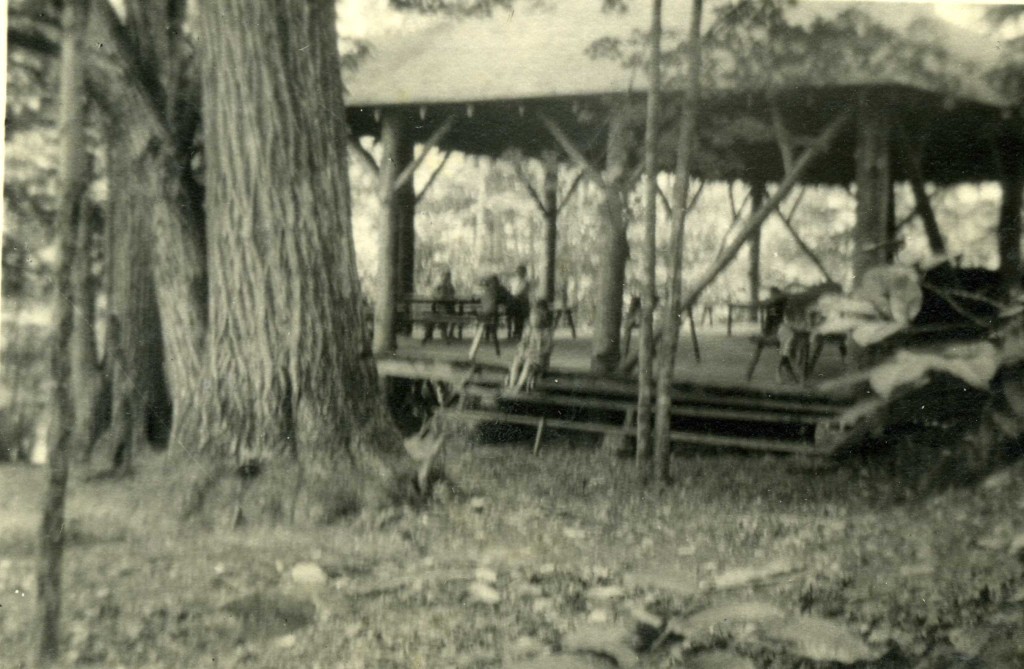
House in the Woods pavilion showing tables and children and open plan. .II_2_early_days_122c.jpg
It’s great fun when the country people come in, and especially interesting to see out children with their unwashed, uncombed and otherwise generally unprepossessing brothers and sisters. Almost every tree at the House in the Woods had a nag tethered to it, and all the benches were filled with people — sort of like a moving picture show, the way they came and went as they felt inclined.
The meeting opened with the singing of “America” — mostly children singing. Henry Creech presided, and introduced the speakers with ease and dignity. Mr. Clayton talked to the men about orchards and fruit-
[page 2] … growing in a very simple way, and the men were most attentive. Then Mr. Ogg, an elderly gentleman of Scotch extraction and not at all like Mr. Baldwin, though he’d taught school for many years and is now a farmer. I’m afraid they didn’t care much for him: He began with a eulogy of the mountaineers, who in spite of lack of advantages still produce leaders, and we wondered what he would say next, but all that followed was a description of a farm in Ohio where the problems were absolutely different from those of the mountains, ‘where they don’t know alfalfa from phosphorus. We adjourned to the playground for dinner, and there they had two big iron kettles set up, and chicken stew in one and mutton stew in the other; and we passed around bowls to about seventy people. I was somewhat disappointed in the stew for I’d seen the lamb being led to the slaughter and seen it hanging up over in the sawmill, and had heard it was to be roasted whole, but the dinner was more of a gypsy meal than a barbecue.
In the afternoon they made simple tests of the soil with litmus paper, demonstrating the acidity of the soil around here, and distributed litmus paper among the farmers so that they could make their own tests. The domestic scientist spoke on cooking, but it was getting late then, and I’m afraid she had few to listen to her. And it was her first experience among illiterate people, and she had no idea of their problems – wanted them to copy recipes for white bread, which they never eat, even if they could have written anything down. I felt sorry for her – she was just out of school, Iowa University, and arrived in a black broadcloth suit which was soaking wet from a shower that came up as they were crossing the mountain. She stayed here, and I’m afraid got a bad impression of the children, who were especially rampant that night.
They are going to have a country fair here next year, and organized an executive committee yesterday. Miss Butler (Marguerite Butler Bidstrup) is secretary and treasurer. We hope that by that time the fireside industries will be started so that the women can exhibit tied lace and baskets and weaving, etc. Having a big country affair like that will do much to set a standard for not brewing – but baking and churning.
1915-16 [008] End of October. I certainly am having experiences with the boys of the family. The little girls are very harmless, … (p.2-3)
I certainly am having experiences with the boys of the family. The little girls are very harmless, and punishing them is really a diversion, compared to the boys. They really aren’t to blame for all the fighting and noise, of course, but when you let them go at all, then there’s nothing but fighting and noise, and no work is done. Yesterday I dealt with Chester, the largest boy in the class, and much too big to whip —, for bullying his small brother, and I sent him out of class at, recess and tried to carry on the school work in spite of his singing, whistling, and laughing like a loon, throwing sticks and leaves into the class, etc..(This was in the House in the Woods.) After school we had it out. He refused to apologize to me for disturbing the class, and I sat down and took down on paper every word he’d said. “Dag-gone it, you just better quit pickin’ on me. You haint nary speck better’n me ‘n I won’t take it… I wont apologize and you caint make me, and you caint, an’ I won’t stand up and apologize till I git good an’ ready.” And so on for about ten minutes. Then silence, during which I read quietly for about ten more minutes, and then tears. When they subsided, I got him to acknowledge that his tongue had run away with [page 3] him and that he didn’t mean it, and we ended by shaking hands and kissing, and I fed him on cheese and biscuit from my room, he having missed his dinner by that time.
Far otherwise Bobbie, who has run wild ever since Miss de Long has been away, doing just exactly what he pleased. I never thought I’d come to whipping, but I whipped him twice in one day, and now he does just as I ask him, even to going to bed quietly after a lovely fairy story.
Martha is a lovely child, with pink cheeks and blue eyes and yellow curls, the oldest little girl in the house, and very responsible and “good.” And all the boys are much attracted, and shower her with attentions, from handkerchiefs with fancy borders to pennies and kisses, and we really have to do some chaperoning. Lately we’ve heard Munroe and Christopher, betting each other that they dare not go up and kiss the little girls goodnight after they’d gone to sleep; so when last night the boys all went to bed quietly, we were on guard. About a quarter to nine, Mrs. Light [Ella C. Light, Housemother 1915-1916] and I heard someone get out of bed on the boys’ sleeping porch, open the door softly, and go upstairs, then footsteps overhead, and we sped up lamp in hand. On the sleeping porch one little girl sitting up in bed, eyes popping in surprise, and underneath a bed, a pajam’d leg. Mrs . Light hauled at it, wondering who it would be, and between us we pulled him out – Munroe, very much scared, every hair on end, and face ,white as a sheet. These boys always have something to say, and he began at once: “Now Miss Light and Miss Wells, you can believe me or not, but I just came up to kiss the little girls goodnight, an’ anyway I heard them a-stirrin’ first.” You have to know Munroe to appreciate the situation. He is a child who always has possessions — stray pencils, a velvet ring-box, and always money. He’s very homely and his nicknames, “Tubby” and “Whaley” are appropriate. But he’s sharp and bright in school. He thinks a great deal of dress, and always fusses about the breeches given him, wanting to put on his (buttoned) shoes before the other boys have stopped going barefooted, and always appearing in a sad little black felt hat that is much too small for him. At present he’s badly in need of a hair-cut, too, and when he starts out to school in trousers too long for him, corduroy coat and little hat, lugging his big geography, he reminds one strongly of Benjamin Franklin arriving in Philadelphia with his loaf of bread. Well, he was so funny that we could hardly control ourselves, so I said, “That’ll do, Munroe, it won’t do any good to talk like that”, and we packed him off to bed; – and then doubled up in silent mirth at the dramatic scene. Today has been very peaceful!
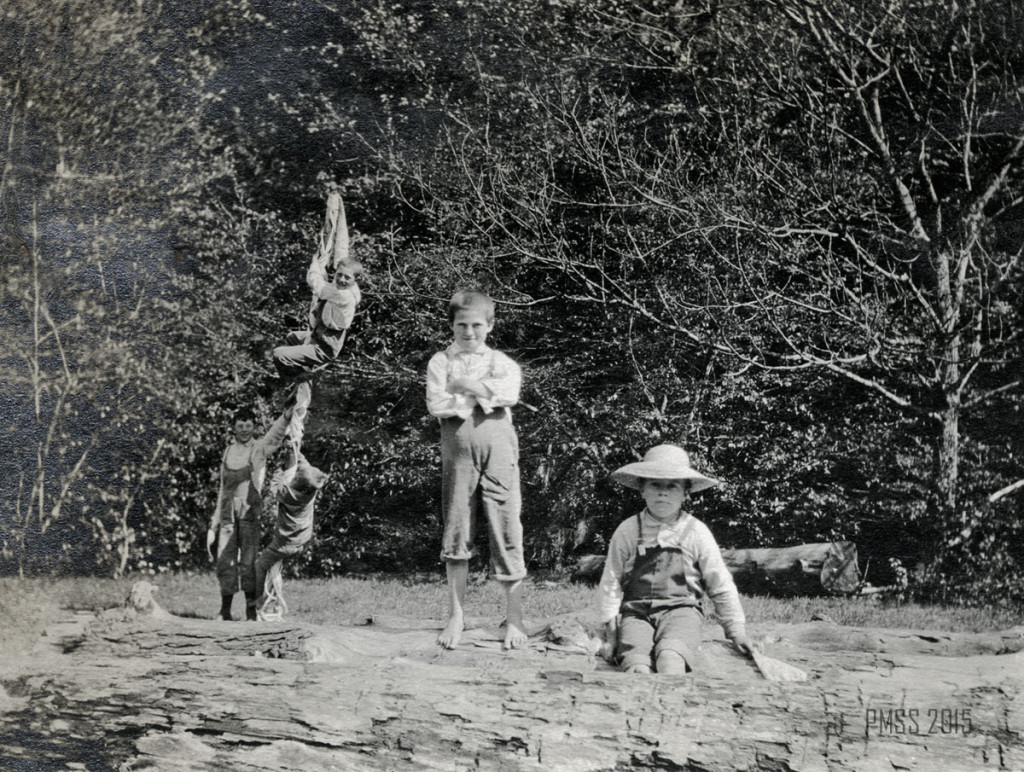
027a P. Roettinger Album. “The end of the May pole – Munroe [center], Charlie and the three Lewises.” [Five boys: Two in the foreground on large logs, one standing by a pole in the back, and two climbing on the pole.]
Tomorrow comes Hallowe’en, and the “children are much excited. The party is to be here (at Far House I), beginning at 4 o’clock and continuing through supper, with more party for the older ones in the evening. We have to go slow on the “buggers” and “ha’nts”, for the children believe in them firmly.
1915-16 [009] (From “The Tent”, written early in the fall, Probably Sept.) Yesterday Miss Butler [Marguerite Butler], Miss Reed [sic] [Dora Hill Read Goodale] and I started out to a meetin’ and baptizin” four miles away… (p.4)
(From the Tent”, written early in the fall) Probably Sept. Yesterday Miss Butler, Miss Reed [sic, Read] and I started out to a meetin’ and baptizin’ four miles away. It was a perfectly lovely walk down creek after creek, following Greasy to Big Laurel, — woods and rocks and water, pretty rough trail, scattered houses — where people came to the door with children to say Howdy and urge us to come and spend the day with them – well, if not today, then sometime soon, all three of ye! We got to meetin’ after most of the people had collected and the hillside was a picture, with mules and horses picketed everywhere, — about 150 people present. After a regular howling ranting time – two sermons and four endless gospel hymns, which had to be lined out*,— we adjourned down the creek to Dave Harris’s, where eight souls were saved and eight women came out of the water sanctified and shivering. After greeting everyone we walked on down Big Laurel to Rock House, expecting to eat dinner with Aunt Judy Turner. But Aunt Judy was out for the day, and the children didn’t seem inclined to give us even a bite of corn-cake. so after a drink of water and an apple, we started home — six miles and no dinner! At first I didn’t think I could do it, but I soon forgot my hunger. We got home in time for supper and were pretty glad to find there was chicken and plenty of it. Whenever possible we eat supper down by the creek among the rhododendrons (in front of Big Log.)
(Also from The Tent.) I can at least begin this while the water is heating for a bath (in big iron kettle outdoors). Such a gorgeous starry night up here in the tree-tops, and only the crickets and the crackling of the fire under the kettle, and the trickle of the creek.
The second week of school is over, and I hope a trifle more successful than the first! It is discouraging at times, because it’s such a strain to hold the children’s attention, and the ropes still creak a bit. But there’s been a little less discipline, and a little more school work, and at any rate I hate to think of leaving the House in the Woods when the weather turns cold, and we have to go down to that stuffy, ratty schoolhouse (the lodge room above store).
The first week was very strenuous. I was “on” all day Monday and Tuesday and intend never again to let that occur. Miss de Long is starting the Barn this week, and had to go off to see about lumber and workmen, and I took charge of her family (Far House I) in the afternoon and Tuesday night put them all to bed. Wednesday I was free all day after school, and Miss Butler, Miss Lyman [?] and I started off after dinner for Jack’s Gap,
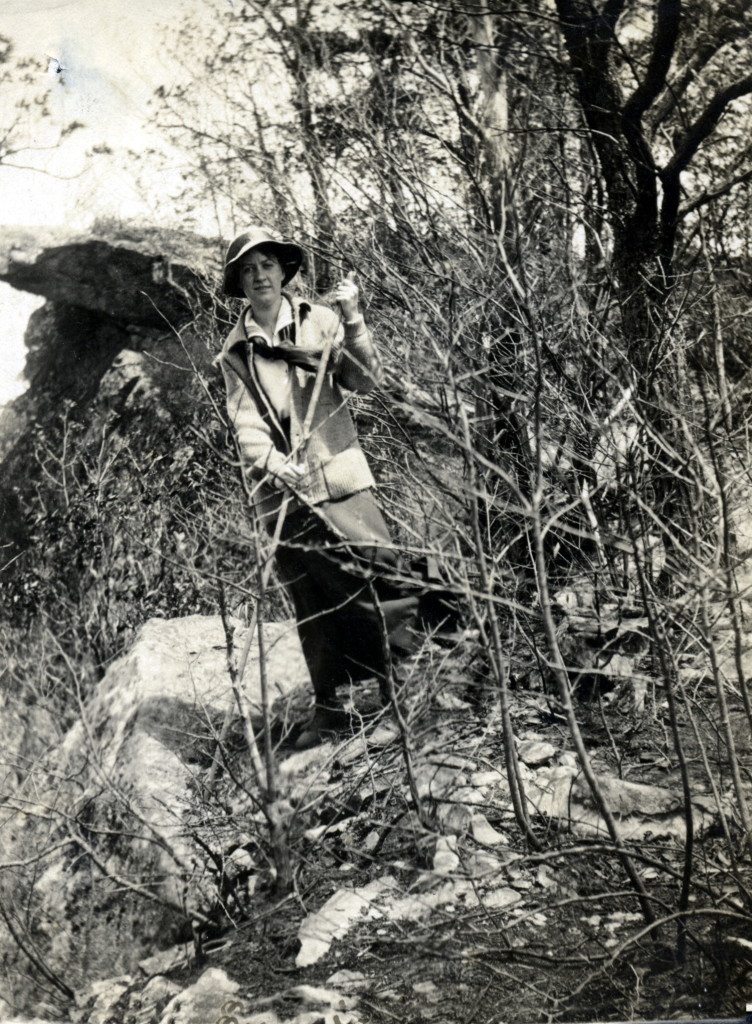
“On a hike” at Jack’s Gap, unknown woman. [X_099_workers_2527p_mod.jpg]
taking our supper with us. It’s a wonderful pile of upturned granite on the top of Pine Mountain, about five miles away. It was a perfectly lovely climb, along the road for two miles, past Columbus and Henry Creech’s houses, and they all came out to pass the time of day, and Columbus gave us grapes. Delia and her young ‘uns were stringing beans on the porch (not taking the strings off the beans but putting the beans/on strings to dry for the winter. Some of the houses have whole sides covered with them.)
Then we left the world, plunging through a thicket of rhododendron in approved fairyland style, and then climbed up among the chestnuts and oaks — not many pines, alas — up to the big granite [p. 5] shoulder of the mountain, where it is so narrow that you are scrambling on either one side or the other, with the land suddenly dropping on both sides of you. I got the best idea of the country that I’ve gotten yet. We could see into four counties, Perry, Leslie, Letcher and Harlan — an unending sea of hills and ridges, and only two houses in sight, way down below us in the valley. It certainly made me realize how isolated we are, here, and it was hard to think that there were really any people down there. We were up there about two hours, and the run down, after cooking coffee over a campfire and toasting our blackberry marmalade sandwiches and beaten biscuit, made us scuttle to beat the dark. The last bit of trail was, more or less, guess-work on our parts. Snakes and squirrels and toads went scuttling out of our way, and we decided to say nothing about the snakes, as mountain people consider it a disgrace to see one and not kill it. We were in bed by 8.30, after a good bath, and full of fresh air and view. It’s a wonderful place to go to, but not to live in. I like looking up at hilltops for steady diet.
1915 [010] Sunday Eve. Sept. 19. Tonight we all had a picnic supper on Limestone Branch. (p.5)
Tonight we all had a picnic supper on Limestone Branch. At five o’clock, after getting Anne into some clean clothes and seeing to it that all the children were washed and brushed, the family started out, each grown-up with at least two little things clinging to her hands and clothes. Over a split-rail -fence and into the cow pasture, where Uncle John Shell’s calves smelt ‘us and the children patted their noses kindly; through another fence and down to a little dell past which the brook ran, with the mountain rising steeply behind, us — and a view of the far-away hills and glow in the west. Miss Read [Dora Read Hill Goodale ] had made a fire, and Miss Pettit’s children brought the supper over, great pans of white and brown bread sandwiches, with country butter, cheese, chicken, and coffee and cake; and we toasted the sandwiches and cheese over the fire. The children were crazy with joy at having something to do, and were perfectly willing to sit there and toast face and fingers as well as bread and cheese for us grown-ups, who sat around on stones, Miss Gaines [Ruth B. Gaines] in the center dispensing cups and spoons and food, the big boys and men behind under the trees, and down under the sky Miss de Long, with Anne and Ella on each side of her, lovely Mrs. Light [Mrs. Ella C. Light] nearby, and Miss Pettit [Katherine Pettit, Director], as usual, on the very edge, but being very entertaining. Service was unusually nice —- we had to hurry a bit, as the twilight fell so suddenly, and every once in a while the fire would flare up and light the ring of children’s faces around it as we sang. Then a hasty gathering up of dishes and food, and Miss de Long [Ethel de Long] hastening her flock home before dark, and the place was left to Miss Read [Dora Hill Read Goodale], Miss Lyman [?], Miss Rusbatch [?], Miss Butler [Marguerite Butler] and me, to put out the fire. Then down the Branch a few steps, through the little pasture where there were already patches of moonlight, over the fence and up the wooded hill to the tent [Similar to the one below.].
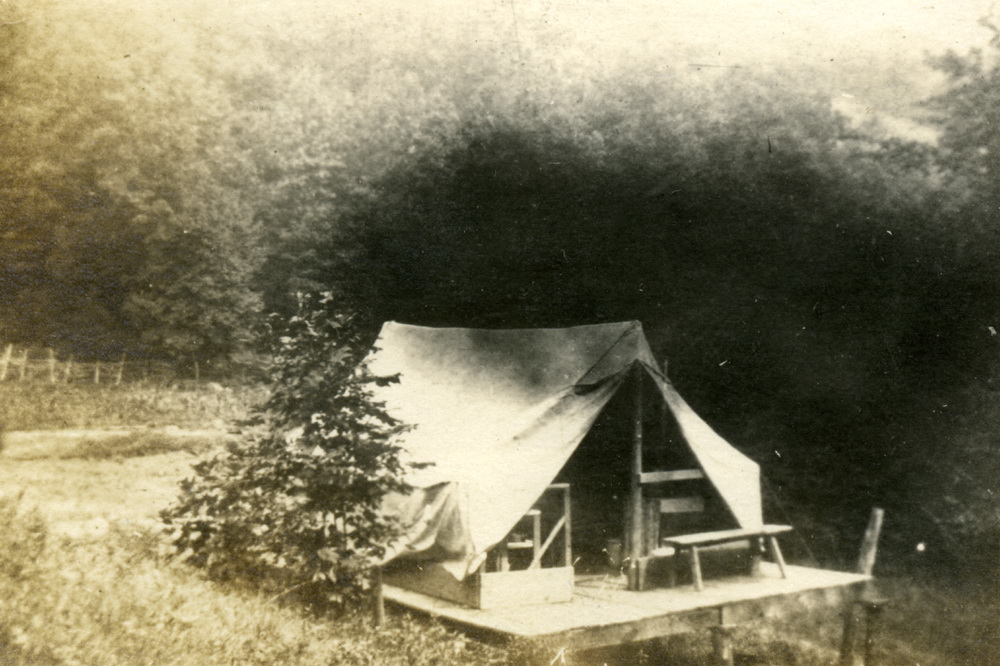
“Mary Rockwell Hook’s “Architectural Studio” View of tent. hook_album_2blk__024.jpg
1915 [011-012] October. After the children were in bed and apparently quiet, and I was settling down to cheese and dates and the Atlantic… (p.5-6)
(After the children were in bed and apparently quiet, and I was settling down to cheese and dates and the Atlantic) there was the most awful scuffling in the living-room, as if all the [page 5] furniture was being overturned, and. all the newspapers being torn up. Then suddenly someone prancing on the porch outside my door, but when I looked out, nobody in sight, and I began to think it was a “bugger” of which the children’s minds are full these days before Hallowe’en. Finally, however, it came back, and looking out again I saw it was Peter, the kitten, who had gotten into the tanglefoot flypaper, and was crazy with fright. He shot into my room and I had all I could do to pull the stuff off. Much of his hair came with it, and he was sore and scared for hours, and would not be comforted till I took him, stickiness and all, to bed with me, about an hour later.
An epidemic of bows and arrows has broken out this week. At first they shot only at targets, then the little ones began, and yesterday our five-year-old Marcus nearly put out Leonard’s eye. Now the law has descended and we are on the watch as much as it’s humanly possible to be, hoping nothing really serious will happen during Miss de Long’s absence.
Yesterday, being Sunday, we could all lie abed another hour in the morning, and were looking forward to a leisurely getting up, but at 4.30 came sounds of scurryings from the girls’ sleeping porch and Mrs. Light [Mrs. Ella Sue Light] got up and found every one of them prancing downstairs. She stood at the head of the stairs and spanked each one soundly as they came past, much to their surprise, and we put them all to bed at 5 o’clock. Our brains are weary devising punishments to fit the crime. I suppose we are really awfully strict, for the children are very little, some of them, but if we’re the least bit lax with one child then they all swarm. Mrs. Light and I discuss the rearing of children in all our spare time. Of course, if they had nothing but severity and were held to their Jobs from sun-up to sun down, it would be a regular Squeers place*, but they do get much mothering, and their play time is not supervised, and they can be perfectly spontaneous there. [*Squeers refers to a Charles Dickens, Nicholas Nickleby character.]
That afternoon we climbed up the mountain after lunch, through brush and brier to a pine grove where we found a lovely grassy spot and a fine view, and there we took our ease till late afternoon, reading and writing and sleeping — a much-needed change. Today we are feeling fine again.
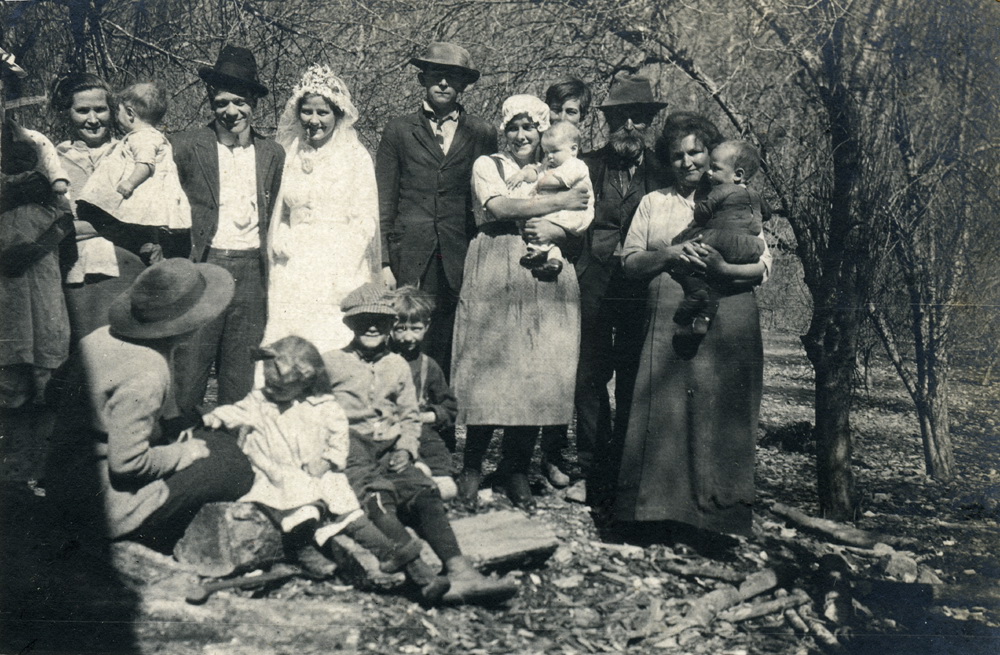
Friends & Neighbors : “Rob Short, Mary Mann, Renee Scearse, Mary Ann Begley,” wedding. Vl_34_1108_mod.jpg
We had a wedding on Saturday. [Similar to the one above.] Mallie and Oscar [Begley ?], who have been courting — or rather she has, mountain fashion — were married at the Big Laurel church. Mallie is eighteen. Her father has a still, her mother is half Indian and Mallie has lived at the school for two years. Oscar is twenty. He is the one who went to Harlan Town to have his case tried. (When he got there he found the case had been dropped, so that is the last of that. He is a very taking youth and always has some cute remark to make. He told me the other day that I was”mending”, and I couldn’t imagine what he meant, until I was told that I was “gaining”. I should like to have gone to the wedding. There was much excitement after the preaching was over, and we heard the shooting up here, and of course there was carousing. Oscar aims to build him two houses (every separate room is a “house”) under a wa’nit [walnut] tree he’s always loved, and he has enough money to buy a hog, so there they are.
We have had a Victrola at Far House for a week and it has been a blessing in many ways. The children will study hard, work hard, go to be quietly if you’ll only play them a tune, and such silent, attentive listeners, I am sure never sat around a talking machine and listened to “Marching Through Georgia”, “Dixie”, “Ticklish Reuben”, and the violin records of Kreisler and elinan [?], to say nothing of an Unfinished Symphony or two. That was a pretty wonderful gift to this place.
Don’t worry about diseases. As to bandages, you see the children go barefoot and get all kinds of stone bruises, and the ground is infected in many places, and the poison gets under their skins and causes “risings”, sores with a scab on them, which they scratch with dirty fingers, and that of course spreads the infection. But, there is no danger of catching it if you have no open places on your skin. However, we are very careful about hand-washings. If the sores are carefully bandaged, then the child can’t scratch and they cure themselves.
1915 [012-013] November 8 [3 ?]. Monday afternoon, and here I sit in my room again writing home, after a hundred miles of horseback and an interesting visit. I’m so full of it that I can never get it all written! … [See EVELYN K. WELLS 1915 – On Horseback to Hindman] for full transcript (p.7-12a).]
1915 [12a] Fall, cont. [Missing page?] Moving into Far House: The children are all living on the sleeping porches….(p.12a)
Moving into Far House [Far House I]: The children are all living on the sleeping porches. I’ve gone through basket after basket of clothes to be sorted and put away in the supply closet, sewed labels on sheets and towels and counterpanes that go into immediate use, stood over Phronie, who has to be watched, and kept five children busy at their tasks. They do all the sweeping and dish-washing and “packing” water from the spring, and they usually sing as they work.
At Big Log LIndy, age five, laid up with an infected leg, sits on the porch and shells cowpeas, and usually has some ridiculous remark for passers-by. She’s the one who when caught in the dining room after dinner said she wasn’t eating anything but the crumbs in her teeth. She has absolutely no front teeth.
Of an old man in the neighborhood: He takes a bath in the creek before going into his winter underwear, and another on the first of May, rain or shine, when [he then] takes it off. “Katherine”, he says to Miss Pettit, “Don’t ever wash your throat in winter. Sal she washed mine t’other day, and I’ve had a sore throat ever since. This to MIss Pettit, whose zeal for cleanliness made her sun the victrola records till they cracked!
Conversation with Bobbie on religion, his favorite topic: “Where’s Heaven?” “I don’t know, Bobbie, nobody does.” “Yes sir, prophets know, and they live nearer to God than anybody.” “Jesus says Heaven is in our hearts, Bobbie, if we keep them pure.” “Where’s Jesus?” “He’s in our hearts if we want him to be there.” “Well, I surely want him in mine, and I’m going to have him there.” This from a seven-year-old who has known every kind of ill-treatment and came to school because he wanted a “lastin’ stayin’ place.”
Sol Day‘s stir-off. Behind the house they had set up a great trough on stones, under which they kept a long line of fire. Three or four men with lanterns (this was an evening affair) were keeping the sorghum from burning, by stirring it with paddles and the sweet smell just filled the air. All around were neighbors with sticks of sugar-cane, which they dipped in the foam on top and then sucked — good, but awfully sweet! The moon came up and lighted the sugar patch on the hilltop where all the sweetness came from. Finally they drew the trough off the fire and poured the liquid off into buckets, and then we all went down to the sawdust pile and watched the set-running. A set is really a quadrille, only danced as fast as you can do it, the boys snapping their fingers to speed things up and calling out the figures, “Wild Goose Chase,” “Home Swing”, etc.
1915 [13] November 22. More about Bobbie, who ran away recently because he had been punished for misdemeanors. .. (p.12a-12b)
More about Bobbie, who ran away recently because he had been punished for misdemeanors. He had run off to his Uncle Carter (Coots), who is absolutely the worst man around here, but who had an awful fascination for Bobbie. On the way home from a long and lovely ride through the mountains, we met him. We had tried in many ways to get him back, but although we knew he wanted to come, we couldn’t get him away from his uncle. He was trudging along with all the family, looking just like any little mountain child. We stopped and asked him if he wouldn’t come along with us for a visit, and his first impulse was to come, but the minute Carter spoke, back he turned to him – which was strange, because all that Carter said was that he could do as he pleased. All decisions are left to the children. So this seven-year-old decided for himself to go back to that awful hovel where he would suffer every cruelty and learn every kind of “meanness” and never amount to anything, or whether he should come to us, where he could be trained and where his really unusual mind could develop. Of course we didn’t get him, for you can’t appear too anxious to have any child, and it was sad to leave him there in the road. We have learned since that Carter was hanging around the school for two days before Bobbie ran away, trying to get hold of him, as Aunt Drusilla was sick, and he was needed to carry wood and water.
1915 October 2. Oscar Begley, an awfully nice boy who works on the place, nice but hot-tempered — had to go to Harlan to have his case tried and doesn’t know when he’ll be back. His offense was shooting on the highway… (p.12b)
Oscar Begley, an awfully nice boy who works on the place, nice but hot-tempered — had to go to Harlan to have his case tried and doesn’t know when he’ll be back. His offense was shooting on the highway. Here in the mountains one may commit the ten sins of the Decalogue*, provided one does it in a decent, quiet way, at home, and can get away with impunity. But anyone who breaks up a meeting by shooting, even in a playful, harmless way (1), or shoots on the highroad, goes through all the rigors of the law.
Laundry. Not enough clean sheets and clean clothes, and always the problem of infection from bandages and exposed sores. The children are so little and untrained, it’s almost impossible to keep them
from fussing with bandages. Every infected child is re-bandaged every morning, but those bandages don’t stay in place, and infection spreads. One washes one’s hands with green soap many times a day. Pronounced cases of hookworm and other infections are sent to Louisville for treatment. And control of diet is difficult. Vergil, for instance, has a pronounced case needing to sweets, and if it isn’t gratified, he says he doesn’t get enough to eat and sends word to his father to that effect, and so the word spreads over the countryside that we starve the children.
Housework. On Saturday mornings basins, buckets, pitchers, and furniture are taken out on the terrace, scrubbed with water heated in the big iron kettle, and left to sun all morning. Martha does the lamp chimneys.[IMAGE] Wilson does the chairs, about 20 split-bottomed ones, from which all traces of muddy feet have to be removed, then rubbed down with linseed oil, scrubbed with boiling water and soap, and left to dry for hours. On the sleeping porch, Virginia thought that all the sand she swept up must have been left by the sandman, and Frances clinched it by dreaming that someone came and took the broom and finished the Job.
*[ A variant of the Decalogue, or the 10 Commandments.]
1915 ? – 1916 undated. Yesterday Aunt Sal taught me how to make tied lace, which is made over a knitting needle with bale cotton. (p.12b)
Yesterday Aunt Sal taught me how to make tied lace, which is made over a knitting needle with bale cotton. Very few people know how to make it nowadays, and in the past old fashioned houses used to be trimmed with it, not only on the edges of counterpanes. Aunt Sal is going to teach me to spin, too.
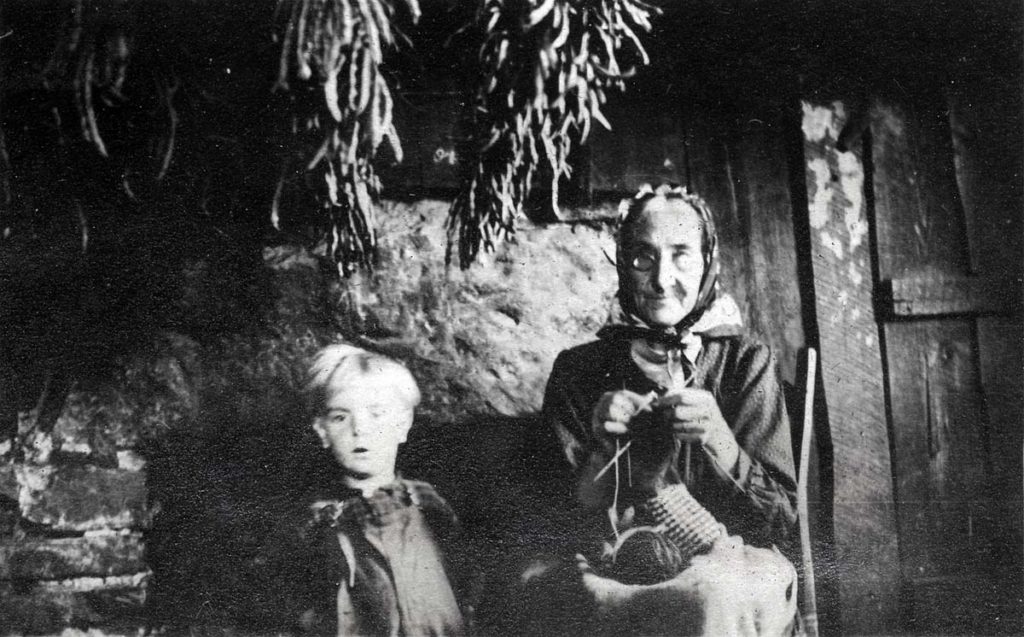
Aunt Louise [? may be Betts] with Brit Wilder ? [melv_II_album_048.jp]
Her sister, Aunt Betts Scott, is visiting her now, quite the most magnificent old woman I have seen. She is very large, and it’s a sight to see her striding down the road in her wide calico skirts and kerchief.
1915 November 21. (Columbus Creech came down with smallpox. Question of quarantine, post office, etc., vaccination.) (p.13)
(Columbus Creech [a son of Uncle William Creech] came down with smallpox. Question of quarantine, post office, etc., vaccination.)
The minute the question of quarantine came up, four of the workers decided to go home, because it might interfere with their Christmas vacations (two of them), and two because they’d been actually exposed to Columbus. Miss Gaines [Ruth B. Gaines] went home because she was too run down to be vaccinated. That meant all the workers from Miss Pettit’s house and none from Miss de Long’s, so I came down to Big Log to fill in. Here, there is much less actual work, because the children are better trained, have been here longer, and are older.
The school will not be quarantined, but the post office may be. It certainly ought to be. If it is — well, anyway, even if it isn’t, we shall have to go to Incline, seven miles away, for our mail. Yesterday I rode to Incline for it (Much thrilled at being asked to go). I started at 12 on one of the school mules, wearing all my woolies, for it promised to be cold. I felt very official with the mailbag over my shoulder and my credentials buttoned into my skirt pocket (divided skirt – no breeches for ladies in those days). I followed the road for seven miles, and it was wonderful to see those long sloping spurs of Pine Mt. for miles ahead. And after all it wasn’t cold, and the woods were just flooded with sunshine, and you could see the moisture from the creeks being drawn up by the sun. At two I reached incline Post Office where Jo [Joe] Creech, another son of Uncle William, is Postmaster. His house is quite pretentious, being one of the painted-frame variety, but the kitchen is a little log house at the back, and in the kitchen is the post office. The mail wasn’t due for an hour, so I spent it in Mrs. [Joe] Creech’s house and had a most interesting visit. She’s a “right quaint little woman who has raised seven young ‘uns.” Tilford and Elhannon work here at the school [Pine Mountain Settlement School]; Ethel, 15, is sworn in as deputy postmistress. Ethel is not domestic, and was off on a “pleasure trip,” when I got there, and only returned in time for the mail. Henry Wilder, [husband of Deliah Creech] who lives above us, goes down to Ross Point across the mountain for the mail and brings it over to Incline on two mules. At Incline our mail is taken out and brought up here to Uncle William’s, as a precautionary measure. The packages were all put in a separate sack and brought up on an extra mule, and I brought the first class mail, getting back at 5:30 and it was so pretty to see the lights in all the different houses along the valley. I gave the school call (variant of the “sang-gatherers’) and it was answered from Miss Pettit’s and Miss de Long’s. Hot turkey soup, ending with a doughnut (sent me in a Thanksgiving box by a Louisville friend), and a piece of Miss de Long’s Edam cheese. At this point the mule broke loose from the picket fence and I had to get out all the big boys to catch him. And, the doctor arrived from Harlan to vaccinate us. I wouldn’t have missed seeing the
excitement of being vaccinated (“black-snaked” the children call it.)
The Far House children were done first, being the youngest, and they came into the living room all fresh and warm from their baths and in their clean nighties, with their left sleeves rolled way up and in different stages of scare and excitement. Miss de Long set an example and went under the knife first, and of course the youngest ones were the gamest. Then we came down to Big Log and after that family was done some of the boys who work on the place came in, at first just out of curiosity, but all finally had themselves scratched and promptly pulled out their dollars in payment, thought they were all scared of losing a day’s work.
The mountain people have smallpox very lightly, being in a constant state of innoculation, I suppose. A sort of natural vaccination is going on all the time in their blood, and they are out of doors so much that the fresh air does much to counteract the bad living conditions. However, for many weeks not a soul on the place is to go into any mountain home, and after that only if there’s no sickness of any kind in the house. Good rule always. (Yesterday I was only in the doorway of the Creeches at Incline and out of doors every other minute, and here at the School I’m out of doors nearly all the time. And these sleeping porches are wonderful for the children.)
Now for Sunday School. I am taking Miss Pettit’s children out to the woodpile for a Bible story and hymn-singing.
(More on smallpox in a later letter).
1915 Thanksgiving Day. [018] A beautiful day. We started out with a nice breakfast party for the visitors from Hindman, at the Pole House… (p.14)
A beautiful day. We started out with a nice breakfast party for the visitors from Hindman, at the Pole House, and by the time things were cleared up it was time to start up to the woods. What a procession: every child carrying some kind of bucket or pan of food. we established ourselves, some 60 strong, in a lovely glade about a mile from here which the children call the Fairy Forest, it’s so full of moss and soft grasses and pretty rocks and laurel. We had three big fires, one for the coffee, and two for the squirrels, which we toasted – roasted – on long sticks, while the children played in the woods. When the squirrels were done, we sat around and had pork, squirrel, sandwiches, jelly, pumpkin pie and coffee. It was so warm that we didn’t even need sweaters.
Then a very simple lovely Thanksgiving Service. A hymn or two, and the story of the first Thanksgiving, told by Munroe, age 11, on the spur of the moment, very simply and dramatically. Then Miss de Long talked for a little while, using St. Francis’ Prayer to the Sun as a starting point. She certainly can touch and hold every kind of person, and there was nary a one of the sixty – mountain people, children, or workers, that didn’t get much from what she said, we ended with “Come, ye thankful people, come”, and out in the woods I suddenly realized what the line, “Come to God’s own temple” meant, especially to people who have never been inside a church. Then the children sang “under the Greenwood Tree”, some of them, a little way off, echoing the last line as if from another part of the forest. They call it the Robin Hood song.
Afterwards the little girls ran sets, and the boys had a shooting match with bows and arrows. The problem was to prevent Lisa Cobb (of Hindman) from joining the party for Jack’s Gap, for she is delicate and won’t admit it. But finally Uncle William decoyed her away to show her some interesting trees, and we made our escape. Jack’s Gap is the most beautiful place in the world, and the lights and colors at this time of year are so soft we got back to Miss Pettit’s for supper — TURKEY — and a nice evening. The children sang ballads and Miss Pettit was in fine form, with many stories of the beginnings of Hindman and Pine Mountain. When I got back to Far House, there was another party going on. Several mountain young people, one of them with a banjo. They are perfectly content to sit and pick the whole evening the tunes that sound exactly alike. When they sing to the banjo, there’s a long monotonous accompaniment and now and then a line of the ballad thrown in in a dreary nasal voice, and when the theme is thrilling as it usually is, you just sit on edge of your chair waiting to see what’s going to happen in the next line.
Friday afternoon we took the Hindman horses out for exercise, I rode the least “feisty” one, a nice little mare with a really stylish gait, and realized for the first time what bad nags I’d been riding. My, but I’d love to have a good horse at my disposal here. It makes riding a different thing.
1915 December 7. Smallpox, Ch. II. Last night, just as I was dropping off to sleep, I heard Dr. Howard of Harlan, outside the house, calling Miss Pettit… (p.15)
Last night, just as I was dropping off to sleep, I heard Dr. Howard of Harlan, outside the house, calling Miss Pettit. Long conversation. Bill Browning down with all the symptoms of smallpox, likewise Aunt Sal. Miss Christie (the nurse) carrying germs around, coming straight into the house here after a call on Columbus without changing her clothes, Miss P. [Pettit] all for setting up a quarantine at once, etc., etc.
This morning, no fires in the rooms, no breakfast. The reason, Pearl and Bertha were “in the bed” with bad arms. (The bed phrase still persists from family days, after they come to school where there are beds for all who come.) Bill Browning [the PMSS farm manager] lives at the Farmhouse down the road, and the schoolroom is just opposite it, so we had school this morning in Miss Pettit’s living room. First interruption from Mary Ann Begley, one of the laundry girls, Arlena was sick – in the bed with a bad arm, and she must have Munroe to help with the washing. Second interruption when the chimney caught fire and boys were sent in every direction for ladders, Mr. Zande, and fire extinguisher (which didn’t work). Luckily however the fire was soon put out. Afternoon given up to setting up quarantine at the Farmhouse. The Misses Bradner [Ruth Bradner, Housekeeper], two men and two children who lived there had to be evacuated, and the procession that wound its way up from the farmhouse looked like Belgian refugees, all carrying what they could — Arthur driving the dump cart filled with scales from the storeroom and bedding, and Will Cornett bringing up the rear with nothing less than a dish of ferns! Up at Far House the grown-ups are all getting vaccinated again, and the children are wholly demoralized and no one can work – a constant display of arms and everyone seeing who can produce the worst-looking one.
1915 November, sometime. Miss de Long arrived late last night from Harlan Town and we all sat up to listen to her tale of how she almost missed getting the $5,000 appropriation from the fiscal court for the Road and all the news of the people she picked up along the way, …. (p.16-17)
Miss de Long arrived late last night from Harlan Town and we all sat up to listen to her tale of how she almost missed getting the $5,000 appropriation from the fiscal court for the Road and all the news of the people she picked up along the way, and the <5L/vful Holy Roller meeting she went to. (The Holy Rollers are forbidden to meet in Virginia and they ought to be here in Ky., they’re so useless and emotional and commit all sorts of crimes because they are “saved” and “can’t sin no more.”) Well, we are going to have the road over Pine Mountain, and we are engaging an engineer at this moment, though work will not begin till next July.
Saturday night we had the first hoar frost, making everything like a Christmas fairy-land when we got up. By mid-morning, everyone started off for dinner at Uncle John Dixon‘s. Aunt Lucy Dixon is uncle William’s sister, and they are very nice thrifty folk. The seven miles through the woods were perfect – all kinds of autumn “pretties” everywhere. Along Greasy, over the Divide, down Line Fork, up an awfully steep ridge through the woods and down the other side through the cornfield, we saw Mrs. Dixon on the way, and she was so glad, to see us. Imagine having five people descend on you for dinner after your own meal was all cleared up and put away! But, it was a great event for all of them. There hadn’t been a soul along the road all day, and they craved company. They live in a log house built on the typical lines, but much above the average as regards cleanliness. The plan is two rooms and a “dog-trot” between, a chimney at each end of the house. We went into one room and sat around the fire till dinner, exchanging news and getting acquainted. Cry, a sweet and very sociable girl of sixteen, brought us some delicious wine-sap apples to stay us till the real meal, for which we picked up our chairs and went into the kitchen, and ate gritted cornbread fresh from the oven, with butter and jelly thick upon it, to say nothing of milk and coffee, corn, beans and bacon. Then after another hour of visiting we left about 3:30, exchanging promises to visit each other soon again. Eight of them, and only three beds visible, and that is luxury around here, patchwork quilts on the beds, an organ, a sewing machine, a tin trunk and the usual split-bottomed chairs.
Uncle William visited school yesterday. The children are all very fond of him and to them he is old age personified. We were talking about Indians when he came in, and they all called out, “Uncle William, has you ever fit the Indians?” Uncle William said he haint never kilt a man and he didn’t aim to get kilt by one, which impressed the children — blood-thirsty little things!
We’ve just had a house warming for all the men who had worked on Far House, and combined it with all the people who had had birthdays in October. All day we swept and garnished and trimmed the house with autumn leaves, and the living room and terrace certainly did look lovely, with big baskets and bowls of sourwood and dogwood and black pine everywhere. We bathed and clean-clothed the little girls right after dinner, and shipped them off to hunt chestnuts. At four Miss de Long sent around word to call all the workmen that she wanted to see them all up at Far House. Miss Read [Dora Hill Read Goodale] had made five big cakes. Columbus Creech, little Nora Howard and two of the workmen, and we served them and coffee in tin cups off a table covered with a tea cloth marked M.W [mother of Evelyn Wells ?] McC., while forty men sat around and tipped back their chairs and talked about who cut the first pair of rafters and who put on the last lick of stain, and Miss de Long took detachments over the house. Supper and the children arrived just as the last guests departed, so we just went right on eating on the terrace, by the light of the moon (!) and a lamp in the living room.
Friday night I ran sets for the first time. The older boys and girls and some of the neighbors from eight miles away all went down to the “Foundation”, as everyone calls the beginnings of Laurel House [Laurel House I], and there, on the under-flooring, which is all there is as yet, we “ran” for about an hour. My partner was Bird Turner, one of the best set-runners in the county, and he pulled me through in great style. It was great fun, and not for anything would I have missed being whirled around as fast as I could go while the boys stamped and clapped their hands in time and called out the orders —“Ladies do C, Gents go gee”, “Chase the squirrel”, “Box the ghats” etc. Set-running is our greatest diversion, and people will come to a set-running from a long distance on the shortest notice. But one has to be careful to give very short notice, and be careful who gets in, otherwise someone may bring in some moonshine and then it’s very easy for the men to get to drinking. And there is never any set-running unless Miss Pettit or Miss de Long are there.
The other day I started off at noon with all the children except the two youngest, and we walked to Freddie Creech’s three miles away. Freddie is really one of our children, but went home about a month ago to recover from “risin’s” [skin boils]. The children are lots of fun in the woods, finding you all sorts of nuts and berries and leaves and strange mosses, and we stopped along the way while they made crowns for themselves and me, so that we arrived at the Creeches’ looking very festive. Mrs. Creech used to be the school ‘teacher at Dillon, and with her oldest baby she used to cross the mountain every week-end and go home for over Sunday. Their house has three mission chairs and they have two hundred apple trees, so we started home laden with apples, also walnuts and hickory nuts and turnips, which the children love to eat raw — with often disastrous effects.
On the way back, Bobbie met up with his father, whom he hasn’t seen for three years, the length of the latter!s recent term in Frankfort penitentiary. He has killed the father of two of our boys, who aren’t old enough to take revenge themselves, though he works on the place here — a most attractive, gentle kind of person. But an older brother of our boys lives in the neighborhood, and has been hanging around lately, trying to get work at the School. A big, dark, slouching fellow, who leads the little boys off and has secret meetings with them. We’ll be glad when he is off to Cutchin, where he belongs. The other night, just as I was hopping into bed after the set-running, I heard loud talking down on the road, and three pistol shots, then galloping hooves. [p.15]
1915 Christmas. All this week we have been sitting up half the night opening the packages that came in — a mixed bag! — and filling Tarleton stockings with candy by the hundred (575 in all) … (p.18-19)
All this week we have been sitting up half the night opening the packages that came in — a mixed bag! — and filling Tarleton stockings with candy by the hundred (575 in all). ), and then the family stockings. School stopped on Wednesday, luckily, considering all that had to be done. We trimmed the whole house with laurel and hemlock – ropes, baskets and wreaths everywhere until it was like bringing in all outdoors, so fragrant and woodsy. Thursday afternoon we took the little Christmas trees to Aunt Sis Shell and Aunt Polly Day. We cut the trees along the way and trimmed them by the roadside, and then bore them to the houses, singing “Here we come a-wassailing,” as we arrived. What a picture the children made as we went through the yard at Aunt Polly’s — a yard for the pigs mostly – and into her one-room cabin where she sat coughing and moaning and trying to knit. She was quite cheered however by our visit, and was even moved to show interest in the things we brought her. People around here usually say nothing at all in acknowledgment of a present, though they are really very grateful. “Aunt Polly‘s daughter came in from milking as we were leaving and showed us her twelve-day-old baby, all done up in red flannel and quilts.
Friday the children took a tree up to Aunt Sal’s, but didn’t go in, of course (quarantine). Aunt Sal is almost ready to be released from quarantine, and we left the tree at the gate and she came out and got it. The day was so warm that we had our supper on the terrace by lantern light, and just as we were finishing, Santa Claus arrived with gifts for all the family, and the children were quite overcome. Santa was Mr. Zande, and very adequate in the role, though wordless. He had wanted to give everyone presents and I had stayed up till 12.30 the night before, tying them up, so I was quite surprised to get another gift from him — a handkerchief and a box of face powder. Likewise, gifts for Mrs. Light and Miss Lincoln [Margaret Lincoln, Office worker].
Then we went in and had the big Christmas tree, and hung our stockings up — with the exception of two bad boys who had lost that privilege — such a sad time for them! Then the children — lucky things — went to bed and after fried eggs and bacon, cake and oranges, we went to work. Candy, hair-ribbons, knives, tops, booka, dolls, aprons, shirts, awfully nice things, eight presents for every child, and stockings up up for the two bad ones after they had gone to bed. All the house presents were put in Miss de Long’s stocking, nice toys and books and a beautiful doll.By one o’clock we were in bed and it had started to rain, and the next thing I knew the waifs were outside my window,—singing.
At six we lit the tree and the children came in to their stockings, and had a rapturous hour of it. But such rain — Just teeming! After breakfast, to the accompaniment of French harps —every child got one — I went up to the House in the Woods to trim the big tree, with Mr. Zande‘s help, and some of the hands. One very nice box we’d had was a big collection of Christmas tree ornaments from Marshall Field’s, and we really achieved a lovely tree.
[page 19] About 9«30 the rain turned to snow, which continued all day, piling up everywhere and absolutely transforming things. Yfe didn’t have a big assemblage on account of the weather, only about 150,
mostly men. They began to arrive very early, of course, and I set
them all to work decorating.
The exercises began at eleven with our pageant of carols, which was very lovely in its simplicity. Our manger scene, with Bettie Cornett in a purple veil bending over a manger constructed by Chester that morning, and the shepherds with crooks and gifts, and the Three Kings bearing staffs tied with holly, all against a background of laurel and snow, was beautiful. The little children here to play Old King Cole, but the King was overcome with embarrassment and began to cry, and it was fortunate that Santa appeared just then to distribute candy and snappers and balloons.
It’s such a shame that some unpleasant things interrupt all this gaiety – such as Alec Day, such a nice man, coming with several others as drunk as lords. But of course Christmas is their best time for drinking and shooting. One man at the school’s first Tree got up and made the following temperance speech: “Hit’s been put upon me to tell you fellers as how the school-women don’t want no drinking at their Tree. That’s mighty hard on us, but we’ll have our drams the day before and the day atter Christimas, and then we’ll have two Christmasses.”
We ate our dinner around the fire at Far House, and afterwards the children played with their new treasures and the grown-ups did nothing – a great treat. I was going to have a tea-party for the little girls so they could use their new dishes, but they’d really had enough done for them so the party is put off till some other long winter day.
It was a wonderful afternoon, with the snow piling up outside so quietly, and a fire within. we went to bed early, the children in a blissful state of mind. And after they were all in bed, the Christmas mail came in, a wonderful ending for us.
The next morning we slept late, and the sun was shining on the ridges across the valley, all snowy and bright. I crossed the mountain on a mule, a heavenly ride up through the silent woods, with the trees showering snow on me as I went along.
(This letter was written on the train from Harlan to Pineville, on my way out to “vacation.”)
GALLERY: Evelyn K. Wells 1915 Excerpts from Letters Home
- [well_hist_013.jpg]
- [well_hist_014.jpg]
- [well_hist_015.jpg]
- [well_hist_016.jpg]
- [well_hist_017.jpg]
- [well_hist_018.jpg]
- [well_hist_019.jpg]
- [well_hist_020.jpg]
- [well_hist_021.jpg]
- [well_hist_022.jpg]
- [well_hist_023.jpg]
- [well_hist_001.jpg]
- [well_hist_002.jpg]
- [well_hist_003.jpg]
- [well_hist_004.jpg]
- [well_hist_005.jpg]
- [well_hist_006.jpg]
- [well_hist_007.jpg]
- [well_hist_008.jpg]
- [well_hist_009.jpg]
- [well_hist_010.jpg]
- [well_hist_011.jpg]
- [well_hist_012.jpg]
SEE ALSO:
EVELYN K. WELLS BIOGRAPHY
EVELYN K. WELLS GUIDE TO ADMINISTRATIVE CORRESPONDENCE
EVELYN K. WELLS, GUIDE EXCERPTS FROM LETTERS HOME
EVELYN K. WELLS 1915 EXCERPTS
EVELYN K. WELLS 1915 EXCERPTS Horseback to Hindman
EVELYN K. WELLS 1916 EXCERPTS
EVELYN K. WELLS 1917 EXCERPTS
EVELYN K. WELLS 1918 EXCERPTS
EVELYN K. WELLS 1919 EXCERPTS
EVELYN K. WELLS 1920 EXCERPTS
EVELYN K. WELLS 1921 EXCERPTS
EVELYN K. WELLS RECORD OF PINE MOUNTAIN SETTLEMENT SCHOOL 1913-1928 [INDEX] (Early in-depth history of Pine Mountain Settlement School)
EVELYN K. WELLS PUBLICATIONS
The Ballad Tree: A Study of British and American Ballads, Their Folklore, Verse and Music, Together with Sixty Traditional Ballads and Their Tunes. New York: Ronald Press, 1950. Print.
[See Bibliography below for a listing of additional publications.]
EVELYN K. WELLS, “A Little True Blue American, 1920”
EVELYN K. WELLS TALKS
EVELYN K. WELLS TALK Harvard University July 1, 1955

